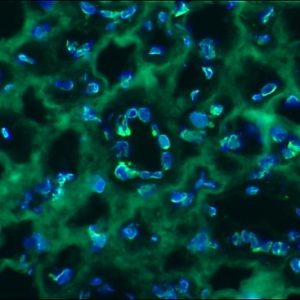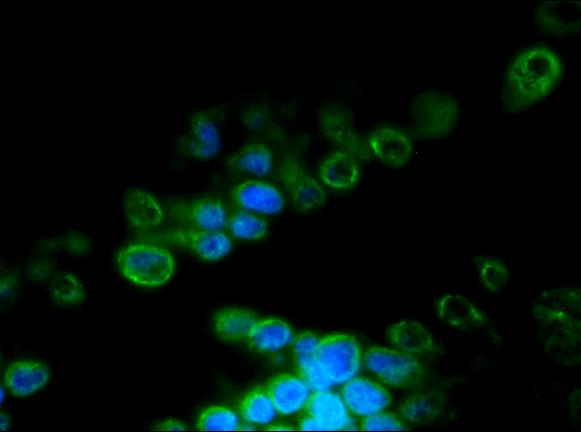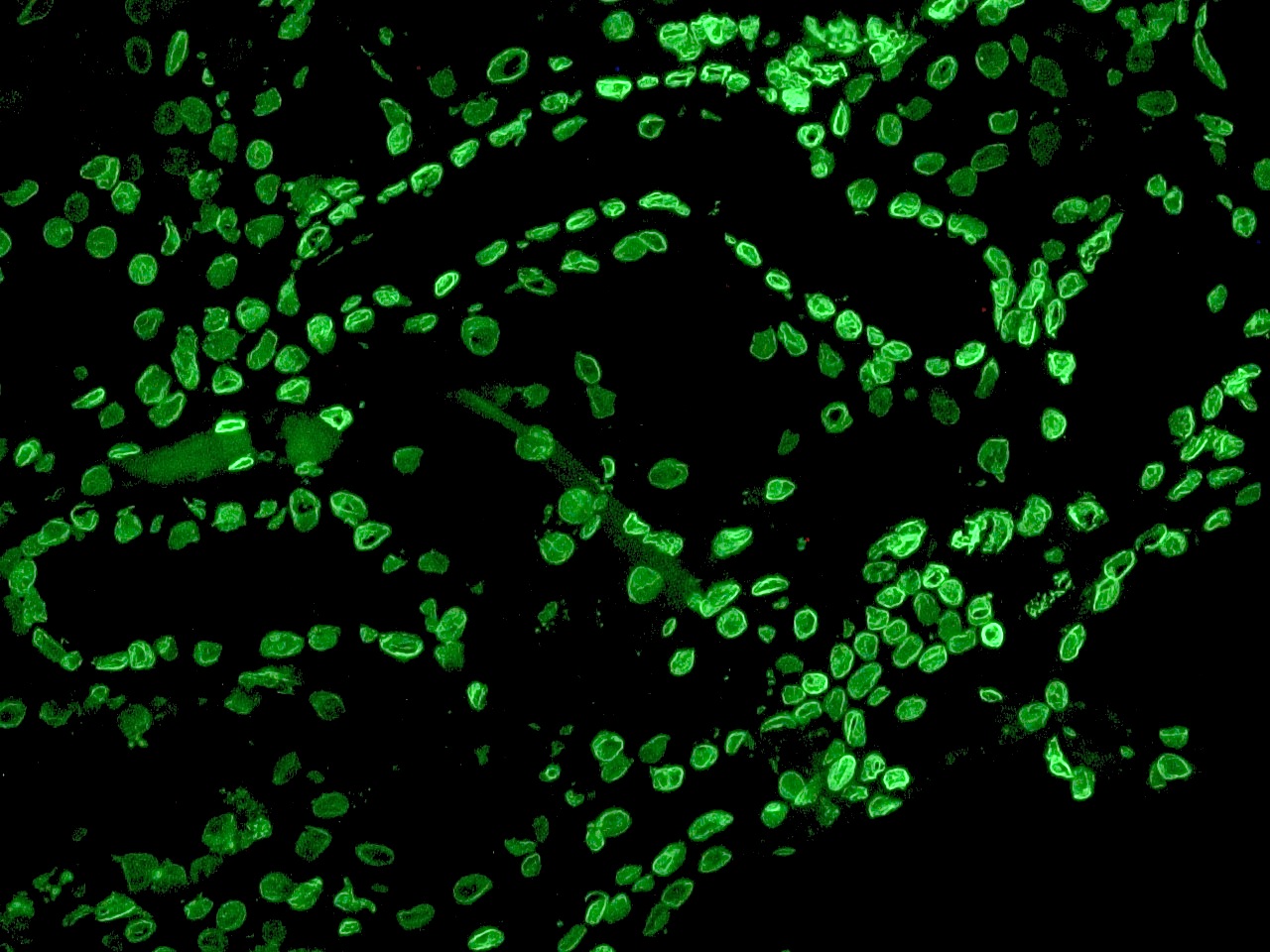Catalogue

Mouse anti Lamin B2
Catalog number: MUB1104P| Clone | LN43 |
| Isotype | IgG1 |
| Product Type |
Primary Antibodies |
| Units | 0.1 mg |
| Host | Mouse |
| Species Reactivity |
Hamster Human Mouse Swine Xenopus Zebrafish |
| Application |
Flow Cytometry Immunohistochemistry (frozen) Western Blotting |
Background
Nuclear lamins form a network of intermediate-type filaments at the nucleoplasmic site of the nuclear membrane. Two main subtypes of nuclear lamins can be distinguished, i.e. A-type lamins and B-type lamins. The A-type lamins comprise a set of three proteins arising from the same gene by alternative splicing, i.e. lamin A, lamin C and lamin Adel 10, while the B-type lamins include two proteins arising from two distinct genes, ie lamin B1 and lamin B2.
Source
LN43 is a mouse monoclonal IgG1 antibody derived by fusion of mouse myeloma cells with spleen cells from a mouse immunized with the detergent insoluble fraction of potoroo cell line PtK1.
Product
Each vial contains 100 ul 1 mg/ml purified monoclonal antibody in PBS containing 0.09% sodium azide.
Specificity
LN43 reacts with an epitope located in the C-terminal part of lamin B2.
Applications
LN43 is suitable for immunohistochemistry on frozen sections, immunoblotting and flow cytometry. Optimal antibody dilution should be determined by titration; recommended range is 1:100 – 1:200 for flow cytometry, and for immunohistochemistry with avidin-biotinylated Horseradish peroxidase complex (ABC) as detection reagent, and 1:100 – 1:1000 for immunoblotting applications.
Storage
The antibody is shipped at ambient temperature and may be stored at +4°C. For prolonged storage prepare appropriate aliquots and store at or below -20°C. Prior to use, an aliquot is thawed slowly in the dark at ambient temperature, spun down again and used to prepare working dilutions by adding sterile phosphate buffered saline (PBS, pH 7.2). Repeated thawing and freezing should be avoided. Working dilutions should be stored at +4°C, not refrozen, and preferably used the same day. If a slight precipitation occurs upon storage, this should be removed by centrifugation. It will not affect the performance or the concentration of the product.
Shipping Conditions: Ship at ambient temperature.
Caution
This product is intended FOR RESEARCH USE ONLY, and FOR TESTS IN VITRO, not for use in diagnostic or therapeutic procedures involving humans or animals. It may contain hazardous ingredients. Please refer to the Safety Data Sheets (SDS) for additional information and proper handling procedures. Dispose product remainders according to local regulations.This datasheet is as accurate as reasonably achievable, but Nordic-MUbio accepts no liability for any inaccuracies or omissions in this information.
References
1. Bridger, J. M., Kill, I. R., O'Farrell, M., and Hutchison, C. J. (1993). Internal lamin structures within G1 nuclei of Human dermal fibroblasts, J Cell Sci 104, 297-306.
2. Jenkins, H., Hölman, T., Lyon, C., Lane, B., Stick, R., and Hutchison, C. J. (1993). Nuclei that lack a lamina accumulate karyophilic proteins and assemble a nuclear matrix, J Cell Sci 106, 275-285.
3. Hozak, P., Sasseville, A. M., Raymond, Y., and Cook, P. R. (1995). Lamin proteins form an internal nucleoskeleton as well as a peripheral lamina in Human cells, J Cell Sci 108, 635-44.
4. Machiels, B. M., Broers, J. L., Raymond, Y., de Ley, L., Kuijpers, H. J., Caberg, N. E., and Ramaekers, F. C. (1995). Abnormal A-type lamin organization in a Human lung carcinoma cell line, Eur J Cell Biol 67, 328-35.
5. Machiels, B. M., Zorenc, A. H., Endert, J. M., Kuijpers, H. J., van Eys, G. J., Ramaekers, F. C., and Broers, J. L. (1996). An alternative splicing product of the lamin A/C gene lacks exon 10, J Biol Chem 271, 9249-53.
6. Machiels, B. M., Ramaekers, F. C., Kuijpers, H. J., Groenewoud, J. S., Oosterhuis, J. W., and Looijenga, L. H. (1997). Nuclear lamin expression in normal testis and testicular germ cell tumours of adolescents and adults, J Pathol 182, 197-204.
7. Jansen, M. P., Machiels, B. M., Hopman, A. H., Broers, J. L., Bot, F. J., Arends, J. W., Ramaekers, F. C., and Schouten, H. C. (1997). Comparison of A and B-type lamin expression in reactive lymph nodes and nodular sclerosing Hodgkin's disease, Histopathology 31, 304-12.
8. Broers, J. L., Machiels, B. M., Kuijpers, H. J., Smedts, F., van den Kieboom, R., Raymond, Y., and Ramaekers, F. C. (1997). A- and B-type lamins are differentially expressed in normal Human tissues, Histochem Cell Biol 107, 505-17.
Safety Datasheet(s) for this product:
| NM_Sodium Azide |

Figure 1. MUB1104P immunohistochemistry on frozen sections of human kidney showing nuclear lamina staining in the ductal epithelium.

Figure 2. MUB1104P immunofluorescence staining of a 9 days old zebrafish embryo.

Figure 3. MUB1104P immunohistochemistry on a frozen section of human kidney showing nuclear lamina staining in the ductal epithelium.



